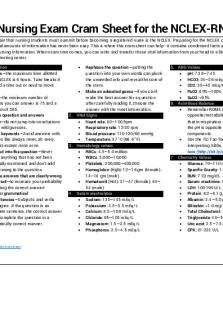Nurseslabs nclex cram sheet PDF

| Title | Nurseslabs nclex cram sheet |
|---|---|
| Author | Rachelle Pierre-Louis |
| Course | fundamentals of nursing |
| Institution | ASA College |
| Pages | 9 |
| File Size | 305.7 KB |
| File Type | |
| Total Downloads | 108 |
| Total Views | 167 |
Summary
Nclex cram sheet. This will help to focus on some key topics to study for the nclex examination...
Description
Nursing Exam Cram Sheet for the NCLEX-RN The final mountain that nursing students must summit before becoming a registered nurse is the NCLEX. Preparing for the NCLEX can be stressful as taking in colossal amounts of information has never been easy. This is where this cram sheet can help-- it contains condensed facts about the licensure exam and key nursing information. When exam time comes, you can write and transfer these vital information from your head to a blank sheet of paper provided by the testing center. 1. Test Information
Six hours—the maximum time allotted for the NCLEX is 6 hours. Take breaks if you need a time out or need to move around.
75/265—the minimum number of questions you can answer is 75 and a maximum of 265. Read the question and answers
carefully—do not jump into conclusions or make wild guesses. Look for keywords—Avoid answers with absolutes like always, never, all, every,
Rephrase the question—putting the
question into your own words can pluck the unneeded info and reveal the core of the stem. Make an educated guess—if you can’t make the best answer for a question after carefully reading it, choose the answer with the most information. 2. Vital Signs
Heart rate: 80 —100 bpm Respiratory rate: 12-20 rpm Blood pressure: 110-120/60 mmHg Temperature: 37 °C (98.6 °F)
only, must, except, none, or no. Don’t read into the question—Never assume anything that has not been specifically mentioned and don’t add
3. Hematology values RBCs: 4.5—5.0 million WBCs: 5,000—10,000 Platelets: 200,000—400,000
extra meaning to the question. Eliminate answers that are clearly wrong or incorrect—to increase your probability of selecting the correct answer! Watch for grammatical
Hemoglobin (Hgb): 12—16 gm (female); 14—18 gm (male). Hematocrit (Hct): 37—47 (female); 40— 54 (male) 4. Serum electrolytes
5. ABG Values
pH: 7.36—7.45 HCO3: 24—26 mEq/L CO2: 35—45 mEq/L PaO2: 80%—100%
SaO2: >95% 6. Acid-Base Balance Remember ROME (respiratory opposite/metabolic equal) to remember
that in respiratory acid/base disorders the pH is opposite to the other components. Use the Tic-Tac-Toe Method for
interpreting ABGs. Read more about it here (http://bit.ly/abgtictactoe). 7. Chemistry Values Glucose: 70—110 mg/dL
Specific Gravity: 1.010—1.030 BUN: 7-22 mg/dL Serum creatinine: 0.6—1.35 mg/dL LDH: 100-190 U/L Protein: 6.2—8.1 g/dL
inconsistencies—Subjects and verbs should agree. If the question is an incomplete sentence, the correct answer should complete the question in a
Sodium: 135—145 mEq/L Potassium: 3.5—5.5 mEq/L Calcium: 8.5—10.9 mEq/L Chloride: 95—105 mEq/L
Albumin: 3.4—5.0 g/dL Bilirubin:...
Similar Free PDFs

Nurseslabs nclex cram sheet
- 9 Pages

Nurseslabs cram sheet for NCLEX
- 9 Pages

Nurseslabs-cram-sheet
- 9 Pages

Nurseslabs-cram-sheet
- 9 Pages

Nurseslabs-cram-sheet
- 9 Pages

Nurseslabs-cram-sheet
- 9 Pages

Nurseslabs-cram-sheet
- 9 Pages

Nclex PN Cram Sheet
- 3 Pages

Nclex Cram Sheet
- 9 Pages

Nclex RN Cram Sheet - nursing
- 3 Pages

2019 Nclex RN Cram Sheet
- 7 Pages

NCLEX Nursing Exam Cram Sheet
- 9 Pages

Nursing Cram Sheet for Nclex-RN
- 9 Pages
Popular Institutions
- Tinajero National High School - Annex
- Politeknik Caltex Riau
- Yokohama City University
- SGT University
- University of Al-Qadisiyah
- Divine Word College of Vigan
- Techniek College Rotterdam
- Universidade de Santiago
- Universiti Teknologi MARA Cawangan Johor Kampus Pasir Gudang
- Poltekkes Kemenkes Yogyakarta
- Baguio City National High School
- Colegio san marcos
- preparatoria uno
- Centro de Bachillerato Tecnológico Industrial y de Servicios No. 107
- Dalian Maritime University
- Quang Trung Secondary School
- Colegio Tecnológico en Informática
- Corporación Regional de Educación Superior
- Grupo CEDVA
- Dar Al Uloom University
- Centro de Estudios Preuniversitarios de la Universidad Nacional de Ingeniería
- 上智大学
- Aakash International School, Nuna Majara
- San Felipe Neri Catholic School
- Kang Chiao International School - New Taipei City
- Misamis Occidental National High School
- Institución Educativa Escuela Normal Juan Ladrilleros
- Kolehiyo ng Pantukan
- Batanes State College
- Instituto Continental
- Sekolah Menengah Kejuruan Kesehatan Kaltara (Tarakan)
- Colegio de La Inmaculada Concepcion - Cebu


